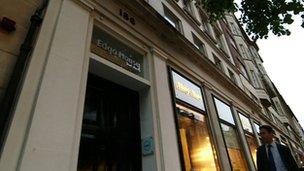UK 'fails to freeze' Mubarak-era assets
- Published
UK 'fails to freeze' Mubarak-era assets - watch BBC Newsnight's full report
The UK government is failing in its commitment to freeze assets of the regime of former Egyptian leader Hosni Mubarak, a BBC investigation has found.
Publicly available documents reveal property and companies linked to key figures in the Mubarak circle that have been unaffected by sanctions.
Egyptian officials accuse the UK of hiding stolen wealth and breaching international anti-corruption accords.
The UK says it is doing as much as it can to trace the funds.
Reports that President Hosni Mubarak and his inner circle stole tens of billions of dollars helped fuel the revolution which overthrew him on 11 February last year.
Three days later, UK Foreign Secretary William Hague told parliament the UK would co-operate with an Egyptian government request to freeze the assets of several former officials.
But it was a further 37 days before Britain and other EU states applied the sanctions - a period when Egypt says the accused officials were able to move their money elsewhere.
About £85m ($135m) of assets belonging to Mr Mubarak, his wife, two sons, and 15 other Egyptians have now been frozen in the UK.
More information
But the BBC investigation found assets that have apparently been missed.
The publicly accessible Companies House register reveals that one of those named on the sanctions list, Naglaa al-Ghazaerly, wife of the former housing minister, was able to register a company in her own name in London in November 2011, seven months after her assets were ordered to be frozen.

The Medinvest company continued operating until February 2012
Another similar document shows that a London investment company, Medinvest Associates, external, co-founded by Mr Mubarak's younger son Gamal, and still belonging to a Cypriot firm he helped run, continued operating until it dissolved itself, voluntarily, in February this year - 11 months after sanctions were imposed.
Meanwhile there is no indication on Land Registry documents of any freeze on the large house worth between £8m and £10m in Wilton Place, off Knightsbridge in London, that was Gamal Mubarak's UK home for many years until the Egyptian revolution.
He listed the house as his address as recently as 2010, when it appears on the birth certificate of his daughter Farida.
The house is registered to a company in the tax haven of Panama. But in international practice, sanctions should apply to any assets of which the named individual is the "beneficial owner" - the person who enjoys the benefit of them, even if the title is in another name.
Britain has accepted official requests from Egypt for legal assistance to help trace and freeze assets. But Egypt says the UK is asking for more information before it can proceed further - information Egypt says it does not have.
Lawful procedure
Assem al-Gohary, head of Egypt's Illicit Gains Authority said: "The British government is obliged by law to help us. But it doesn't want to make any effort at all to recover the money. It just says: 'Give us evidence'. Is this reasonable? We are in Egypt, looking for money in the UK."
The Foreign Office says it has passed all information received from the BBC to relevant authorities, but cannot comment further on individual cases.
Foreign Office Minister Alistair Burt said: "We understand the strength of feeling in Egypt on this issue and are working closely with their authorities to identify and restrain assets their courts have identified as stolen."
But he added: "It is crucial that the recovery and return of stolen assets is lawful. It is simply not possible for the UK to deprive a person of their assets and return them to an overseas country in the absence of a criminal conviction and confiscation order."
He said Britain could not have acted more quickly to freeze assets because such an order cannot be made on the basis of suspicion alone, and it took time to agree a freeze with all 27 EU states, as was necessary.
The UK's approach contrasts with that of Switzerland - once known as an easy place to conceal money - which froze the assets of Mubarak and his associates within half an hour of his resignation last year.
The Swiss Federal Prosecutor Michael Lauber told the BBC he had a team of more than 20 police investigators tracing suspected illicit Egyptian assets.
The total amount frozen has risen from CHF410m (£270m) in February 2011 to about CHF700m (£470m) now - while the amount frozen in the UK has not risen since last year.
Egypt's new Legal Affairs Minister Mohamed Mahsoub said: "The UK is one of the worst countries when it comes to tracing and freezing Egyptian assets."
But he said Egypt itself, where elements of the old regime are still influential, had also failed to investigate adequately.